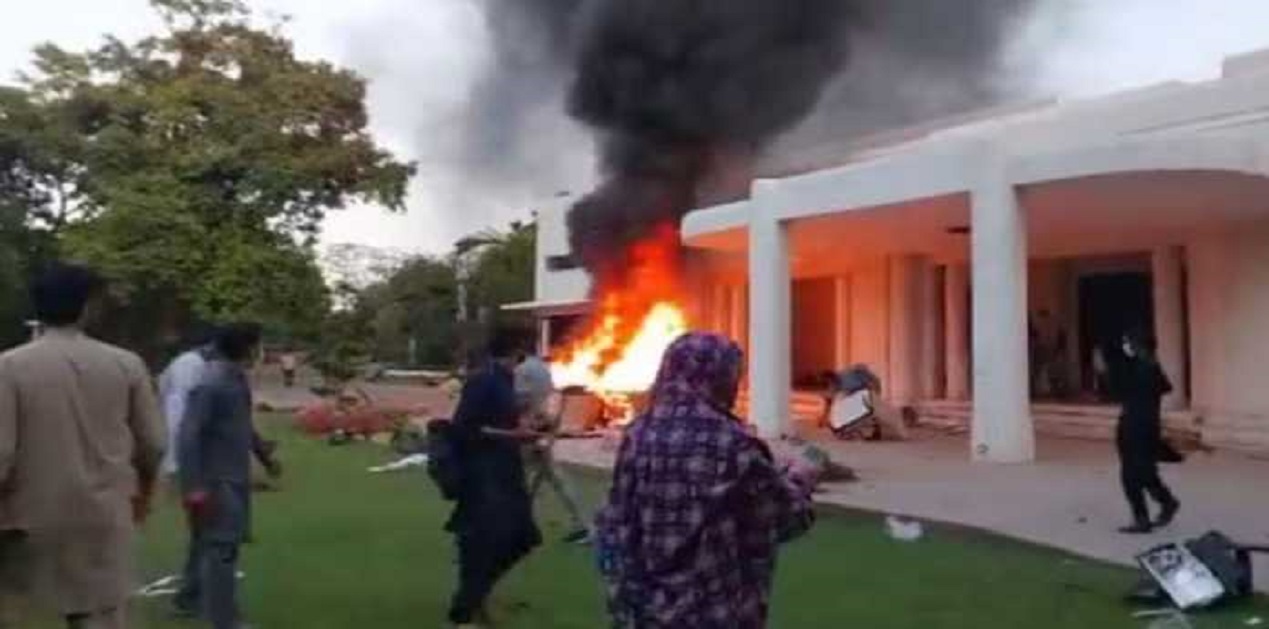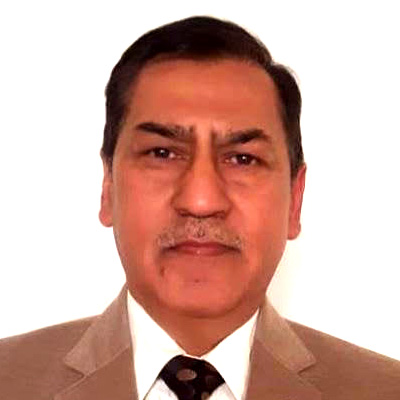At his maiden press conference as the new Director General of the Inter-Services Public Relations (ISPR), Maj-Gen Ahmed Sharif Chaudhry, on 23 April 2023 said that the “…Pakistan Army was a “national army” and that all politicians and parties were “respectable”. The army will not want to go to any one ideology or party. The army and the politicians have a non-political relationship, it will not be appropriate to give it a political colour.” In hindsight, one cannot but find the above statement ironical, with history abounding with military coups, and constancy of “political engineering” by Pakistan Army. The DG ISPR glossed over the outgoing army chief General Qamar Javed Bajwa’s confession in November 2022 that for seven decades the Army had “unconstitutionally interfered in politics”.
More recently, in stark contrast to the above quoted post, is the one after the Special Corps Commanders Conference of 15 May 2023. There are two major facets that need mention. One, while condemning the politically motivated and instigated incidents against military installations after Imran Khan’s arrest on 09 May 2023, the statement expressed firm resolve that those involved in these heinous crimes against the military installations and personal/ equipment will be brought to justice through trials under relevant laws of Pakistan including Pakistan Army Act and Official Secrets Act.
There has been much debate over the Pakistan military courts’ jurisdiction to try civilians ever since in 2015. Pakistan legalised military court trials of terror suspects for a period of two years in January 2015, later further extended till 2019, with due approval/ amendment to Pakistan Army Act by the Parliament. In fact a category added was of civilians attacking military officers or installations that could be tried by military courts.
Having studied the military courts trying civilians, the military jurisdiction over civilians had been previously termed by International Commission of Jurists as a “glaring surrender of human rights and fundamental freedoms.” Later, Peshawar and Lahore High Courts had set aside convictions of nearly 450 cases tried by the military courts on terrorism-related charges, on grounds of being based on malice of facts and law.
Recently, PTI’s senior leaders and cadres have been arrested in thousands under the Maintenance of Public Order Act (MPA), on charges of instigating and directing the violence against the military. With alternative evidence being brought to fore by PTI, it is likely that the military courts may turn ham-handed and lead again to poor discharge of justice, contestable again in civilian courts. This is bound to be a long-drawn process.
Two, more importantly, the Corps Commanders forum emphasized need of national consensus amongst all stakeholders to address ongoing political instability at priority so as to restore public confidence, reinvigorate economic activity and strengthen democratic process. The forum also resolved to support all such efforts to reach this much needed consensus.
There is need to contextually consider the nature of change happening in Pakistan with the arrival on the scene of Imran Khan and PTI, albeit with the establishment’s help. Historically, Pakistan military has always seen itself as a breed apart, and vastly superior to Pakistani civilian society, especially the politicians. Its professionalism, discipline, efficiency and solidarity have repeatedly enabled it to take over the state, or dominate it from behind the scenes with a civilian Government at the helm in a hybrid democracy.
It must be stated that Pakistan military controls a ruthless business conglomerate -it owns everything in the country, from factories and bakeries to farmland and golf courses. Many of Pakistan's largest corporations are also controlled by the military, thanks largely to an opaque network of powerful 'foundations'. The largest three -- the Fauji, Shaheen and Bahria foundations under the Army, Navy and Air Force respectively, control more than 100 separate commercial entities involved in everything from cement to cereal production. The military leadership always justified its power and privileges and ever-increasing perquisites as just rewards for its labour in the course of building a Pakistani nation and state. Many of Pakistan’s own intellectuals accuse the Army of being more interested in making money than in defending the state.
However, the Army is a microcosm of the larger society which has apparently developed a following for Imran Khan and the PTI. The Army, and its extension– the veterans and families, hence would have internal differences of opinions on Imran Khan, with the Army hierarchy. The noted author Ayesha Siddiqa in her article in the online magazine The Wire on August 2022, had stated thus. “If the current (till Nov 2022) army chief Qamar Javed Bajwa, widely viewed as the most powerful man in the country, has shown signs of weakness in taking on the PTI leader (reference to Imran Khan), it is not because his respect for democratic principles is greater than that of his predecessors. Rather, there are divisions within his own fraternity, which is comprised of serving and retired military personnel.” Even before the recent events, there were apparent cracks in the Army hierarchy! Obviously, the autonomy in functioning of the Army Chief – Gen Asim Munir was suspect, seemingly beholden to the PM Shehbaz Sharif for appointment as COAS.
The events of 09 May 2023, now called the BLACK DAY, are nothing short of catastrophic for Pakistan Army. As it is Imran Khan’s by name criticism of the COAS – past and current, and the DG ISPR and ISI was itself a rarity in Pakistani politics. In most ways, the alarm in the Pakistan Army hierarchy is natural and on expected lines, as very large number of prime military establishments were violated by uncontrollable crowds. That this was a response to the arrest of Imran Khan, which had the Army’s connivance, is immaterial as the challenge was to Pakistan Army’s very legitimacy, and its well nurtured authority of over seven decades. By all means, this threatens to drop the Army from awe-inspiring pedestal that it had placed itself.
More than to the politicians of PDM or PTI, the stakes for Pakistan Army are just too high. The civilian hordes have tasted blood in targeting Army institutions at the helm. The Army’s strongest base – Punjab witnessed maximal trouble. This will provide strength to inimical elements in Sindh, Baluchistan and KPK and the TTP. There could be recognition among the politicians that the Army does not have to be part of democracy in the form that makes it hybrid. Most importantly, there is a futuristic challenge to the business empire of the military, its raison d’être! The business interests, already under serious gaze thanks to the dire economic situation, cannot be allowed to go under! In sum, Pakistan Military could eventually become an organisation like any other in global democracies, a totally unacceptable apparition! What this picture portends, is a bleak future to its status of the ‘ultimate,’ the panacea organisation the Pakistan Army, which was always around to implement the ‘doctrine of necessity.’
Hence, to dissociate itself from the unacceptable spectre, it becomes mandatory for the Pakistan Army, riding on the shoulders of the insecure Government, to undertake strong steps. It has to ensure that Government remains supportive of its interests. This leads to denigration of PTI and its leadership in public eyes by creating robust narrative and by tying it legally. Undoubtedly PTI and Imran Khan has provided many an opportunity to create this environment. Will the Military/ Government attempt to disqualify the PTI hierarchy from elections, and even ban the political party, is a moot question. This will disallow PTI riding the wave of popular support in the next elections. In the legal wrangling to follow, plenty of scapegoats will be charged, tried and punished, to deter any similar incidents in future. On a contradictory track, the Military has also to show itself as reasonable and astute in public eyes, to provide succour to the anxiety that reins in the nation at large, and restore public confidence.
In the ISPR statement, there is a telling comment of military facilitating the political parties to ‘reach much needed consensus.’ It is apparent that Army will try to remain relevant to the political process, to the electoral scene and ensure the hybrid democracy that suits it.
In Pakistan, willy-nilly, what will bind the nation, and rejuvenate its nationalism and patriotism is anti-Indianism and Jammu and Kashmir issue. These are time-tested and assured routes to resurrection of Pakistan Military in public eyes! Naturally, economic and political woes in Pakistan deter major escalation, narratives could be created that fan anti-Indianism, and create the right fervour internally. Best would be to lay the responsibility on India, and escalate the situation on the LOC or internally in J&K, a likelihood that has to be catered for.
(The paper is the author’s individual scholastic articulation. The author certifies that the article/paper is original in content, unpublished and it has not been submitted for publication/web upload elsewhere, and that the facts and figures quoted are duly referenced, as needed, and are believed to be correct). (The paper does not necessarily represent the organisational stance... More >>
Image Source: https://pakobserver.net/punjab-puts-rs2lac-bounty-on-attackers-of-lahore-corps-commander-house/










Post new comment